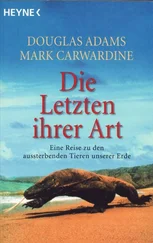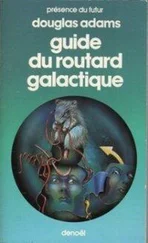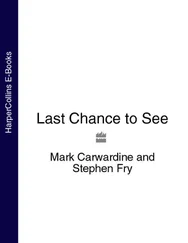Douglas Adams - Last chance to see
Здесь есть возможность читать онлайн «Douglas Adams - Last chance to see» весь текст электронной книги совершенно бесплатно (целиком полную версию без сокращений). В некоторых случаях можно слушать аудио, скачать через торрент в формате fb2 и присутствует краткое содержание. Жанр: Фантастика и фэнтези, на английском языке. Описание произведения, (предисловие) а так же отзывы посетителей доступны на портале библиотеки ЛибКат.
- Название:Last chance to see
- Автор:
- Жанр:
- Год:неизвестен
- ISBN:нет данных
- Рейтинг книги:5 / 5. Голосов: 1
-
Избранное:Добавить в избранное
- Отзывы:
-
Ваша оценка:
- 100
- 1
- 2
- 3
- 4
- 5
Last chance to see: краткое содержание, описание и аннотация
Предлагаем к чтению аннотацию, описание, краткое содержание или предисловие (зависит от того, что написал сам автор книги «Last chance to see»). Если вы не нашли необходимую информацию о книге — напишите в комментариях, мы постараемся отыскать её.
Last chance to see — читать онлайн бесплатно полную книгу (весь текст) целиком
Ниже представлен текст книги, разбитый по страницам. Система сохранения места последней прочитанной страницы, позволяет с удобством читать онлайн бесплатно книгу «Last chance to see», без необходимости каждый раз заново искать на чём Вы остановились. Поставьте закладку, и сможете в любой момент перейти на страницу, на которой закончили чтение.
Интервал:
Закладка:
These Rodrigues fruitbats you've come to see, we have to feed them on a mixture of fruit and powdered dog food reconstituted with milk. They used to be fed a diet rich in banana which did them no good at all and only gave them a nervous tic.' He shrugged.
`I don't know what you've got against them,' said Mark, 'I think they're great animals.'
'I've nothing against them. They're great. They're just common that's all.'
Mark protested, `It's the rarest fruitbat in...'
'Yeah, but there are hundreds of them,' insisted Richard.
`Hundreds means they're severely endangered!' said Mark.
'Do you know how many echo parakeets there are in the wild? exclaimed Richard, 'Fifteen! That's rare. Hundreds is common. When you come to Mauritius and you see things in such a last ditch state, everything else becomes unimportant. It becomes unimportant because we're witnessing here a species which could be saved if people put their minds to it, and if it does go extinct it will be our fault because we never got around to saving it. There's fifteen of them left. We've got the kestrels up and the pigeons up purely because of the effort we've put into them, the money and the personnel. The parakeets? We're working very, very hard to save them, and if we don't manage it they will be gone for ever, and we have to worry about somebody else's rabbits.'
He shook his head, and then calmed down.
`Listen,' he said to Mark. `You're right. The Rodrigues fruitbat is a very important animal, and we are working to protect it. It's lost a lot of its habitat because the people of Rodrigues live by subsistence farming which means that they've done a lot of forest clearance. The bat population is so reduced that one big cyclone - and we get them here - could wipe them out. But the Rodriguans have suddenly realised that it's actually damaging their own interests to cut down the forest, because it's reducing their water supply. If they want to preserve their watersheds they have to preserve the forests, which means the bats get somewhere to live. So they're in with a chance. By the world's standards they're severely endangered, but by the standards of these islands where every indigenous species is endangered, they're doing fine.'
He grinned.
`Want to see some endangered mice? he said.
'I didn't think mice were an endangered species yet,' I said.
'I didn't say anything about the species,' said Richard. 'I just meant the particular mice. Conservation is not for the squeamish. We have to kill a lot of animals, partly to protect the species that are endangered, and partly to feed them. A lot of the birds are fed on mice, so we have to breed them here.'
He disappeared 'into a small, warm, squeaking room and re-emerged a few seconds later with a handful of freshly killed mice.
`Time to feed the birds,' he said, heading back towards the Landrover from hell.
The best and quickest road to the Black River gorges where the kestrels live is a private one through the Medine sugar estate.
Sugar, from the point of view of the ecology of Mauritius , is a major problem. Vast swathes of the Mauritius forest have been destroyed to provide space to grow a cash crop which in turn destroys our teeth. This is serious anywhere, but on an island it is a very special problem, because island ecologies are fundamentally different to mainland ones. They even have a different vocabulary. When you spend much time on islands with naturalists you will tend to hear two words in particular an awful lot: `endemic' and 'exotic'. Three if you count 'disaster'.
An 'endemic' species of plant or animal is one that is native to an island or region and is found nowhere else at all. An 'exotic' species is one that has been introduced from abroad, and a disaster is usually what results when this occurs.
The reason is this: continental land masses are big. They support hundreds of thousands, even millions, of different species, each of which is competing with another for survival. The sheer ferocity of the competition for survival is immense, and it means that the species that do survive and flourish are mean little fighters. They grow faster and throw out a lot more seeds.
An island, on the other hand, is small. There are far fewer species, and the competition for survival has never reached anything like the pitch that it does on the mainland. Species are only as tough as they need to be, life is much quieter and more settled, and evolution proceeds at a much slower rate. This is why you find on, for instance, Madagascar , species like the lemurs that were overwhelmed aeons ago on the mainland. Island ecologies are fragile time capsules.
So you can imagine what happens when a mainland species gets introduced to an island. It would be like introducing AI Capone, Genghis Khan and Rupert Murdoch into the Isle of Wight - the locals wouldn't stand a chance.
So what happens on Mauritius , or indeed any island, is that when endemic vegetation or animals are destroyed for any reason, the exotic forms leap into the breach and take over. It's hard for an Englishman to think of something like privet as being an exotic and ferocious life form - my grandmother has neatly trimmed privet bushes lining her front garden - but in Mauritius it behaves like a bunch of marauding triffids. So does the introduced guava and numerous other foreign invaders, which grow much more quickly and produce many more seeds.
Black ebony comes from the lowland hardwood forests of Mauritius , which is why the Dutch first colonised the island. There's hardly any of it left now. The reasons for the forest being cut down include straightforward logging, clearing space for cash crops, and another reason: deer hunting. Le Chasse.
Vast tracts of forest have been cleared to make game parks, in which hunters stand on short wooden towers and shoot at herds of deer that are driven past them. As if the original loss of the forest were not bad enough - and for such a reason - the grazing habits of the deer keep the fragile endemic plants from regrowing, while the exotic species thrive in their place. Young Mauritian trees are simply nibbled to death.
We passed through huge fields of swaying sugar cane, having first negotiated our way past the sugar estate's gate keeper, an elderly and eccentric Mauritian called James who will not let anybody through his gate without a permit, even someone he's let through every day for ten years but who has accidentally left his permit at home that day. He did this to Carl recently, who since then has been threatening to superglue the gate shut in revenge, and it's quite possible that he will. Carl is clearly the sort of person who will get as many laughs as he can from a situation by threatening to do something silly and then try and get a few more by actually doing it.
There was a more serious confrontation a little while earlier when Carl and Wendy arrived with a party of officials from the World Bank from whom they were negotiating some financial support. James wouldn't let them in on the grounds that they had two cars and he was only authorised to let in one.
James also reports to Carl and Richard regularly about the movements of the kestrels, not because they've asked him to but just because, other evidence to the contrary, he likes to help. If he hasn't actually seen any kestrels he'll still, in a friendly and encouraging sort of a way, say that he has. This means that now, whenever Carl has to change the coloured bands the kestrels wear round their legs, he makes a point of putting on a different colour so that he will know James is lying if he claims to have seen a kestrel with a band that doesn't exist.
The kestrel we were going to see had been trained to take mice in 1985. The purpose of feeding kestrels in the wild was to bump up their diet and encourage them to lay more eggs. If a kestrel was well fed then Carl could take the first clutch of eggs the bird laid from its nest and back to the breeding centre, confident that the kestrel would simply lay some more. In this way they were increasing the number of eggs that might hatch, but there was a limit to the number of birds available to sit on them, so they had to be incubated artificially. This is a highly skilled and delicate task and requires constant monitoring of the egg's condition. If an egg is losing weight too rapidly, by evaporation of liquid through its shell, then portions of the shell are sealed. If it is not losing enough, then portions of the shell are meticulously sanded to make it more porous. It is best if an egg can have one week under a real bird and the other three in the incubator - eggs which have been swapped around like that have a much higher success rate.
Читать дальшеИнтервал:
Закладка:
Похожие книги на «Last chance to see»
Представляем Вашему вниманию похожие книги на «Last chance to see» списком для выбора. Мы отобрали схожую по названию и смыслу литературу в надежде предоставить читателям больше вариантов отыскать новые, интересные, ещё непрочитанные произведения.
Обсуждение, отзывы о книге «Last chance to see» и просто собственные мнения читателей. Оставьте ваши комментарии, напишите, что Вы думаете о произведении, его смысле или главных героях. Укажите что конкретно понравилось, а что нет, и почему Вы так считаете.







